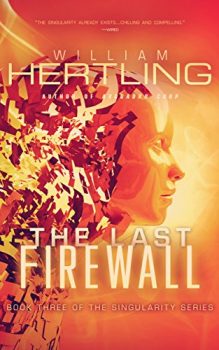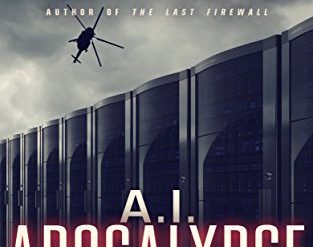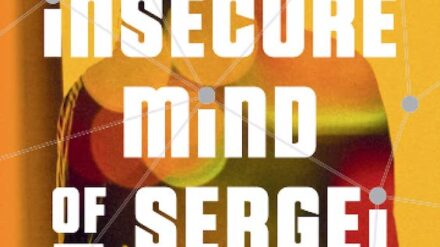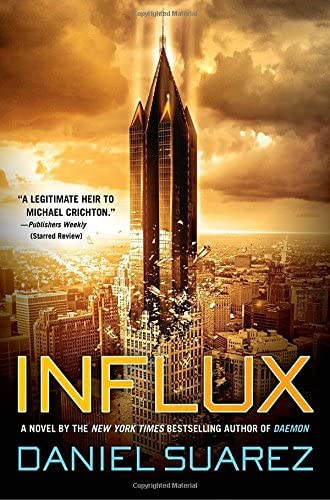
Today some observers of artificial intelligence believe the singularity is near—the point at which machine intelligence will exceed that of the most brilliant humans. The concept seems as though it comes straight out of Silicon Valley. But it originated many decades ago with the legendary mathematician John von Neumann (1903-57).
Over the years since the mid-twentieth century, scientists such as Stephen Hawking (1942-2018) and science fiction authors including, most notably, Vernor Vinge (1944-), have explored the idea. Most recently, the little-known science fiction writer William Hertling has been writing extensively about life after the singularity in a series that includes four novels to date. His first two books, Avogadro Corp and A. I. Apocalypse, illuminate the conditions under which artificial intelligence might achieve sentience, and the picture they paint is sobering. The third book in the series, which features neural implants, is a disappointment.
The Last Firewall (Singularity #3) by William Hertling (2013) 323 pages @@@ (3 out of 5)
In each of the first three novels in Hertling’s series, one exceptional human being holds center stage. Computer scientist Mike Williams achieves artificial general intelligence—by accident—in Avogadro Corp. In the sequel, a brilliant teenage gamer named Leon Tsarev does so, too—again by accident. Now, in The Last Firewall, both Williams and Tsarev join a cast of characters that stars a young woman named Catherine Matthews who possesses extraordinary mental abilities.
In the United States, life after the singularity is dramatically different
The Last Firewall is set sometime in the middle of the twenty-first century years after Williams and Tsarev each triggered the singularity with dreadful consequences (including an AI war). Affluent adults in the United States now benefit from chips implanted in their brains that dramatically increase their intelligence. But Catherine Matthews is an outlier. Years before neural implants became publicly available, doctors inserted one into her brain as an infant to stop the seizures that threatened her life. Now she has uniquely powerful telepathic abilities to manipulate the net and other people through their implants. “People were not supposed to be able to do what Cat could do with her implant.”
Robots have taken over half the jobs
Meanwhile, artificial intelligence has expanded explosively. AI drives eighty percent of the global economy, and “there is one AI for every ten people.” Robots have displaced half the American people from the jobs they’d held. Unsurprisingly, opposition is growing widespread and ugly. And in the midst of this disquieting development, evidence has turned up that nearly 700 people have been mysteriously murdered around the country through their neural implants.
A series of mysterious murders connected to AI
Enter Williams and Tsarev. The two now work together at an institute governing AI behavior, in effect having been charged by the US government with managing the chaos they have unleashed after the singularity. They take it upon themselves to learn what’s going on. However, the team Williams and Tsarev sent to investigate have all disappeared without a trace. Their quest to discover what happened and how it affects their work will eventually lead them into league with Matthews—at the risk of all their lives.
Bonehead errors a good editor would have caught
Although this tale is promising, Hertling undermines it with a series of errors that a watchful editor might have caught.
In The Last Firewall, there are errors of what film producers call continuity. For example, Matthews is either nineteen or twenty years of age, and one of the characters is wounded either in his leg or his arm. And Hertling indulges in spacey New Age exercises involving qi, karate, and t’ai chi ch’uan. He interjects Japanese words (and only Japanese words) without translation into dialog. And the characters in this novel almost always eat Japanese food, wherever they might be. These are bonehead errors. Hertling should have hired an editor.
For further reading
I’ve reviewed the first two books in the Singularity series and enjoyed both a great deal, despite the fact that neither is particularly well written:
- Avogadro Corp: The Singularity Is Closer Than it Appears (Singularity #1), reviewed at A cautionary tale about artificial intelligence
- A. I. Apocalypse (Singularity #2), reviewed at Artificial general intelligence—by accident
For more good reading, check out:
- The ultimate guide to the all-time best science fiction novels;
- Great sci-fi novels reviewed: my top 10 (plus dozens of runners-up);
- Two dozen good books about artificial intelligence reviewed here; and
- The top 10 dystopian novels reviewed here (plus dozens of others).
And you can always find my most popular reviews, and the most recent ones, plus a guide to this whole site, on the Home Page.


























